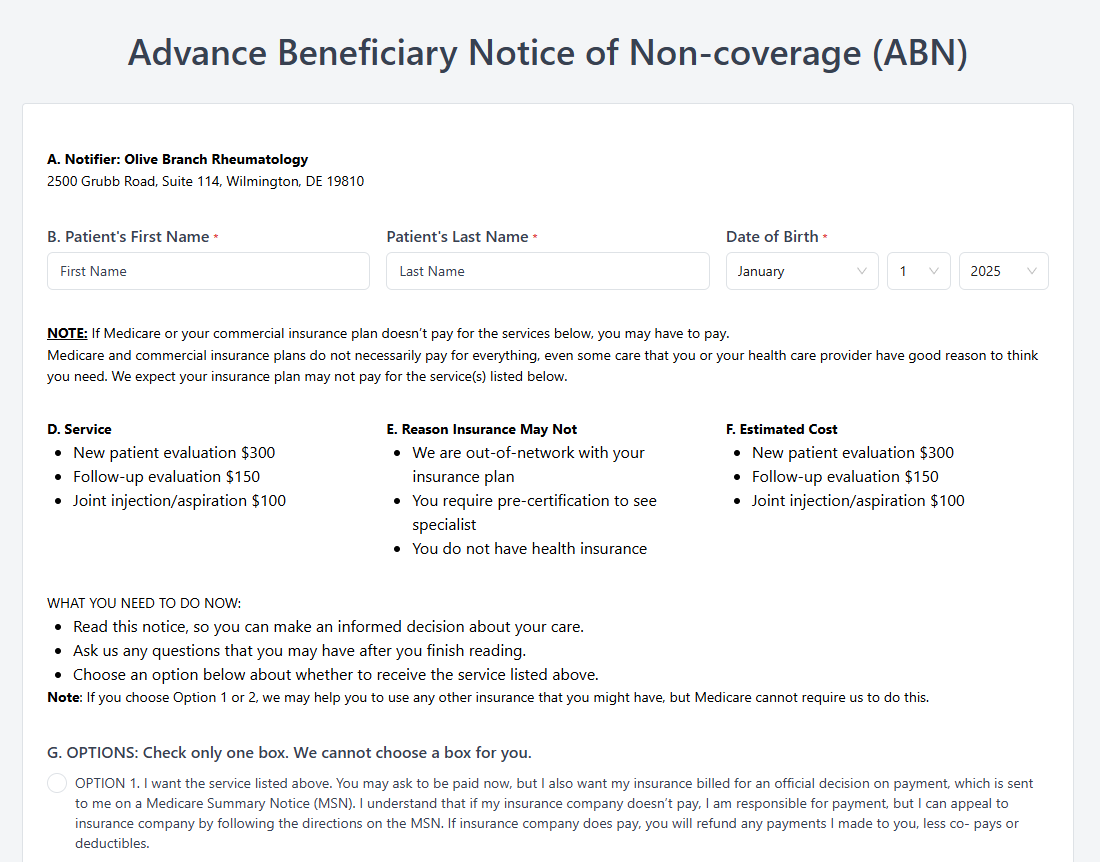

Patients deserve clarity when it comes to understanding healthcare costs and insurance coverage. The Advance Beneficiary Notice of Non-coverage (ABN) form ensures transparency by informing Medicare patients when a service or item may not be covered. Zentake transforms this essential form into a secure, digital experience that streamlines communication, reduces administrative errors, and keeps providers compliant with Medicare regulations. Get started with Zentake’s HIPAA-compliant ABN solution today.
The Advance Beneficiary Notice of Non-coverage (ABN), also known as CMS-R-131, is a standardized form issued by the Centers for Medicare & Medicaid Services (CMS). Healthcare providers use this document to notify Medicare beneficiaries that certain services or supplies may not be covered under Medicare. When patients sign the ABN, they acknowledge potential financial responsibility if Medicare denies payment.
The ABN form is most commonly used in outpatient settings, such as physician offices, diagnostic laboratories, or imaging centers. It helps ensure patients can make informed choices before receiving non-covered services, protecting both the patient and provider.
Clinically, the ABN is required when a provider believes Medicare might not consider a service medically necessary. This preemptive notice fosters transparency, prevents billing disputes, and ensures compliance with Medicare policy.
The ABN is critical for maintaining ethical billing practices and regulatory compliance in healthcare organizations. It promotes patient understanding and prevents confusion about Medicare coverage decisions.
Without a properly issued ABN, healthcare providers may become financially responsible for denied claims. The ABN form ensures compliance with Medicare rules and offers clear communication to patients about potential out-of-pocket costs.
Many healthcare facilities still rely on paper ABN forms, leading to issues like missing signatures, illegible handwriting, and misplaced documents. Zentake’s digital ABN form modernizes the process, ensuring accuracy, security, and efficiency from start to finish.
In a traditional setup, staff members manually print, sign, and file each ABN. This manual process consumes time and introduces errors that can lead to compliance violations. With Zentake, the ABN form is automatically generated, sent to patients for digital signature, securely stored in encrypted servers, and linked to the patient’s electronic record.
Before Zentake, front-desk staff spent valuable time printing and scanning ABNs for each visit, risking incomplete documentation and data loss. After Zentake, those same processes are automated—patients receive forms digitally, sign them online, and the records are instantly accessible to staff. This digital transformation reduces paperwork time by up to 70% and strengthens compliance by ensuring every form is stored securely and retrievable during audits.
Zentake reimagines the way healthcare organizations handle Medicare non-coverage notices through automation, security, and seamless integration.
For example, a multi-specialty clinic using Zentake can automatically deliver the Medicare Advance Beneficiary Notice form to patients before appointments. The system sends reminders, captures e-signatures, and archives the completed form. This process reduces administrative effort and ensures compliance without disrupting patient care.
Transitioning to a digital ABN workflow is straightforward with Zentake. Implementation requires minimal training and immediately improves operational efficiency and compliance readiness.
Clinics adopting Zentake’s digital solutions often report a 40% reduction in administrative time related to documentation. Beyond time savings, Zentake ensures that all ABN forms are stored consistently and securely, creating a complete digital audit trail. Each form is timestamped when sent, viewed, and signed—providing an additional layer of accountability during audits or billing reviews.
Q1. Who can use the Advance Beneficiary Notice of Non-coverage (ABN)?
Any Medicare provider, including physicians, laboratories, imaging centers, and outpatient facilities, can issue an ABN when a service may not be covered.
Q2. How long does it take to complete the ABN form?
Most patients review and sign the ABN within five minutes. With Zentake’s digital process, the experience is even faster and can be completed remotely.
Q3. Is the ABN form required by law?
Yes. Medicare mandates the ABN for specific situations where coverage may be denied. Providers must retain a signed copy to demonstrate compliance.
Q4. Can the ABN form be customized?
Yes. Zentake allows you to customize the form with your organization’s logo and provider details while maintaining CMS-approved content and structure.
Q5. Can I export ABN forms or records?
Zentake enables secure export of signed forms in PDF format for easy integration with billing systems, EHRs, or compliance archives.